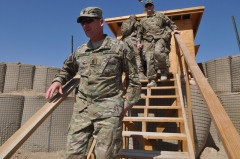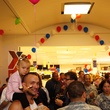Talking to troops, top NCO hears about 'insider threats'


View Gallery (5 images)
KANDAHAR, Afghanistan — The priority for frontline troops was clear as Command Sgt. Maj. Bill Johnson, America’s top enlisted man for ground operations, trudged up the stairs of a bombed out, teetering building in this crucial southern city: on an upper floor two U.S. “guardian angels” peered out over their base through a broken window, rifles at the ready, looking for signs of Afghan soldiers about to attack their coalition counterparts.
Cases of Afghan troops turning their weapons on their international allies have reached crisis levels in Afghanistan, with more than 50 Western troops killed in so-called green on blue attacks (“insider threats” in military parlance), this year, accounting for about 15 percent of troop deaths. Initial reports are that the 2,000th American killed in Operation Enduring Freedom died at the hands of an Afghan counterpart Saturday, adding emphasis to the trend.
The so-called guardian angel position at the Kandahar base was the first thing soldiers here wanted Johnson to see on his tour of southern bases, and it became a theme of his trip.
Johnson said that while the shootings have forced international forces to make adjustments, his Afghan counterparts have been equally aggressive in trying to stem the tide, noting that more Afghans have been killed by their comrades than internationals killed in so-called green-on-blue attacks.
“It’s not only dangerous for us, it’s dangerous for the Afghans,” he said.
In an interview on CBS’s “60 Minutes,” ISAF commander Gen. John Allen said he is “mad as hell” about the attacks and acknowledged that the trend threatened support for the war at home.
“You know, we’re willing to sacrifice a lot for this campaign,” Allen said. “But we’re not willing to be murdered for it.”
Highlighting the delicate balance Western troops are trying to strike between short-term security and fostering the trust and understanding it will take for the long-term training mission planned after international combat troops leave at the end of 2014, soldiers Johnson talked to emphasized the importance of fostering trust with Afghans while operating under what was clearly increased security.
At Operational Coordination Center-Regional South in Kandahar, U.S. Army Col. Mike Kasales said putting up barriers between Afghans and international troops in the name of security is counterproductive, though his own guardian angels were clearly on display, armed soldiers scanning the halls during Johnson’s visit.
Kasales oversees the OCCR, which includes the combined tactical operations center for NATO’s southern Afghanistan command, working side by side with his Afghan counterparts while often dealing with highly sensitive security information.
“There’s a lot of discussion about pulling back — I’ll tell you, here we never pulled back (from working closely with Afghans),” he said. “(Coalition forces) provided a gap for the insurgents to get between us (by pulling back).”
While insurgent infiltration is suspected in some of these attacks, more are blamed on cultural misunderstandings and arguments, which has shone a spotlight on lacking cultural education available to most troops. Learning the ways of a country as different as Afghanistan is a steep learning curve for American troops, Johnson said, but he’s confident that new training programs are improving cultural understanding.
“It’s a lot to learn for a young soldier coming into the Army, never been out of Hometown, USA,” Johnson said.
While green on blue shootings have vaulted to the top of most soldiers’ concerns, another persistent problem for the Afghan security forces is logistics. Johnson said the situation was improving but admitted that Afghans still struggle to supply their troops in a timely manner and, indeed, he heard those concerns from his soldiers in the field Thursday.
“What we’re struggling with is the logistic piece and the administration piece, which (Afghans) don’t have the infrastructure for and don’t understand in the same way we do,” Command Sgt. Maj. Billy Counts told Johnson at Bagh-e-Pul, a police mentoring base on the outskirts of Kandahar. Counts is the CSM of the 503d Military Police Batallion (Airborne) from Fort Bragg, N.C.
Johnson urged patience as the Afghan security forces slowly builds its air force, which will be key to moving troops and gear around the country. For now, they must rely on a handful of Russian helicopters and a few small cargo planes to supply a military that has grown to about 350,000 troops.
A former special forces soldiers who has done three tours in Iraq in addition to two in Afghanistan, Johnson travels about five days a week, visiting far-flung bases across the country to get a sense for the challenges of his enlisted men. Asked about the challenge of keeping up morale for troops fighting an increasingly unpopular war at home, he said he urges troops to tell their story when they go home.
“I think we’re starting to lose a little ground back in the U.S., but I think a lot of that comes from bad publicity,” he said. “All they see is the bad side. I think what keeps soldiers motivated is seeing how well the Afghans have progressed. I tell them, ‘For our brothers who were lost or injured we have to tell the right side of the story.’”
The war here is entering its 12th year and questions have mounted about the wisdom of keeping troops in the country long-term. He said when he gets these questions from military families he assures them their loved ones’ deployments are meaningful.
“Families want to know that their soldiers are making a difference,” he said. “Otherwise, ‘Why am I away from my husband, wife, son, daughter?’ ”
Johnson is also heavily involved with developing the corps of Afghan noncommissioned officers, a foundation of the U.S. military but a facet extremely underdeveloped in the Afghan military, where Soviet trained officers are often loathe to delegate authority to midlevel enlisted men. He said there’s some push-back from more old-school Afghan military leaders, but that he’s optimistic about the noncommissioned officer program.
“I think it’s going to happen in time and when you look at some of the newer commanders (they are) getting that,” he said. “I think we have some older leaders from the Soviet time who either need to get on board or get out of the way and let that develop.”
druzinh@estripes.osd.mil
Twitter: @Druzin_Stripes










